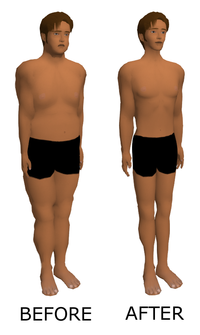
Photo from wikipedia
Purpose To evaluate the predictive effect of the initial weight loss on the long-term weight loss in Chinese patients with a body mass index (BMI) ≥ 32.5 kg/m2 who underwent… Click to show full abstract
Purpose To evaluate the predictive effect of the initial weight loss on the long-term weight loss in Chinese patients with a body mass index (BMI) ≥ 32.5 kg/m2 who underwent LSG. Patients and Methods The follow-up was completed via phone or WeChat for outpatients and at the hospital for inpatients. We evaluated the BMI, percentage of excess weight loss (%EWL), and type 2 diabetes mellitus, hypertension, and hyperlipidemia statuses. Linear and logistic regression analyses were performed on the relationship between the initial and long-term weight loss. The optimal cut-off value was determined by receiver operating characteristic (ROC) curve analysis. Results We enrolled 307 patients, with a median preoperative BMI of 39.68 (35.68, 45.47) kg/m2. %EWL ≥ 50% was regarded as successful weight loss, and 76.55% of the patients lost their weight successfully. (Reviewer #1, comment #4) %EWL at 6 months and 5 years were positively correlated (P < 0.001). Further, the following linear equation could express the relationship: (%EWL5 years = 29.193 + 0.526 × %EWL6 months). %EWL ≥ 58.57% at 6 months was the best predictor of successful weight loss at 5 years after LSG (Reviewer #1, comment #5) (sensitivity, 73.62%; specificity, 73.61%; AUC value, 0.780). Internal verification of the prediction model revealed satisfactory results in terms of discrimination and calibration. Conclusion In Chinese patients with BMI ≥ 32.5 kg/m2 who underwent LSG, %EWL at 6 months and 5 years were correlated. %EWL ≥ 58.57% at 6 months was a predictor of successful long-term weight loss.
Journal Title: Diabetes, Metabolic Syndrome and Obesity: Targets and Therapy
Year Published: 2022
Link to full text (if available)
Share on Social Media: Sign Up to like & get
recommendations!